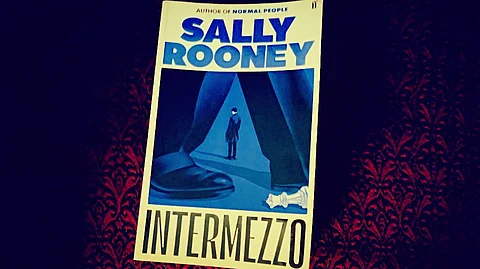

This can be subjective but in the beginning, Ivan Koubek appears to come across as the more likeable of the two brothers, separated by a decade, in Sally Rooney’s much-discussed indigo-coated novel Intermezzo. The brooding, absent-looking 22-year-old in dishevelled clothes and braces at his father’s funeral, inviting the scorn of his mother and brother, could easily win hearts. While Peter Koubek, at age 32, leaving – almost escaping – the house of a young girlfriend for the comforting familiarity of his old sweetheart, simply seems spoiled.
The brothers are both broken, in the days and weeks after their father’s death from a prolonged illness, and the grief appears to manifest in ways neither expects. The distance between them, implanted in the last five years, appears to have grown so much that Ivan is surprised on a day that Peter calls without reason, only to check on him and ask if they could dine out together. They live in Dublin, and if you had prejudices about the less enclosing ties between parent and child in developed countries where most left home on reaching adulthood, you would be surprised.
Through the four hundred and so many pages of Sally’s book, the grief of losing the father appears to push one of them down deeper into an abyss, while the other goes on a path of self-discovery.
Sally does not leave you guessing what’s on their mind. She lets the brothers, and sometimes the girlfriends pick up the narrative, letting you loose in an avalanche of thoughts. Ivan and Peter may be designed to be as different from each other as possible – one a struggling chess champion, the other a rich attorney, one that is poor at winning girlfriends, the other a master of it. But they appear to wander through their thoughts in similar patterns, going over the lines spoken by someone close, again and again, letting the meaning sink in and become more than what it ever was.
The human mind, for all the credit he was just giving it a minute ago, is often repetitive, often trapped in a familiar cycle of unproductive thoughts, which in Ivan’s case are usually regretful in nature.
It is a surprise that none of the people the brothers are close to advice therapy. The damage appears deep, and every bad turn in their lives seems to have put them further away from each other. They seem lost in a labyrinth they can’t find the way out of (and somehow the book cover becomes a fitting image). Through all of it, their age difference is kept afloat. Sally captures this in both the immediate reactions of the brothers – Ivan’s quick outbursts versus Peter’s calm resignation – and the measured recollections that defy their age.
When he is at ease, Ivan, at 22, appears mature – more than his brother and the woman he begins to see, 36-year-old Margaret. His reasoning is a world away from the typically thoughtless declarations of a young lover. But you are given good doses of the past, to let you know that he has only just become this man he earlier wasn’t, that his thoughts about women were not always so broadminded as his brother’s.
Peter in contrast seems to have shrunk from his peak days, torn by tragedies, torn between the women in his life, and as the pages turn, the early impressions about his haughtiness wither away. The narrative might as well be a pendulum moving toward either brother, back and forth.
What is commendable is that even as the brothers form the book's core, the women in their lives are not kept away. They tune in, take over and own the stories. Ivan’s Margaret, and Peter’s Sylvia and Naomi bare their hearts to the reader, and if you have a habit of picking favourites, you may choose one of them over either of the brothers. It cannot be coincidental that Margaret could relate a lot to Peter, age-wise, and experience-wise, and she finds waves of empathy when Ivan describes his brother’s plights. On the other side, Naomi is closer to Ivan’s age, but given his peculiarities, he is closer to the older Sylvia. Patterns, it seems, are a feature you can’t ignore in Intermezzo.
But with all the elements that could – are meant to – shake you in multiple ways, Sally’s Koubek brothers appear unable to find a way into the reader’s mind, staying on the page as characters you read about and wonder about, but not quite feel for. It is not the writing that detaches you, for curly lines have crawled under several passages across my copy of the book.
And bringing this to mind on the bus, he closed his eyes just briefly and felt the proximity of that approaching peace and restfulness, a sense that even now he was proceeding there, that time was moving ahead in that direction, towards the weekend, when he could be near her, and he thought about all the things he wanted to ask her about herself.
It is perhaps the internalisation of the characters – self-reflections that fail to touch – or it might be the lack of conviction in their relations, the closeness not compelling. Then again, the reading of such a narrative, that dwells so deeply into the human mind, can evoke different reactions, it can touch as it can detach. Intermezzo has to be, foremost, regarded as a novel that offers a very subjective reading, that can cast minor spells even on those who fail to connect.